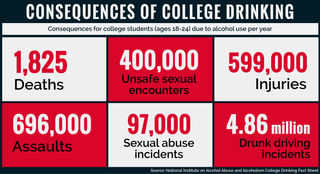Alcoholism
Beyond the College Drinking Game
How parents can address new disturbing trends and dangerous behavior.
Posted October 30, 2016
Drinking on campus is nothing new, but the extent to which we are seeing binge drinking on campus, coupled with a level of excessive drinking that leads to a trip to the emergency room, is a relatively new and disturbing phenomenon worth addressing. Consequently, parents find themselves shifting from the mentality, “Thank goodness it’s not my kid,” to “Oh no, this is my kid, now what do I do?”

As a college professor, I am aware of some things that parents of college students and parents of soon to be college bound students can do that can lead to healthier decision-making. Since we are approaching the time when students will come home to visit for holiday breaks, these are worthy conversations to plan to have.
1. Contact information. Ask students to consider giving their roommates and friends your number as a parent so they can contact you in an emergency. For example, if your child’s roommate or friend has spent the evening with him/her and is concerned s/he has consumed too much and is very sick, unconscious, blacking out, having alcohol poisoning, etc. it is prudent for the roommate or friend to contact trustworthy adults for help including 911, the resident assistant, and parents. This sort of thing is only effective when young people are assured that they will not get in trouble for reporting a problem. Now that many colleges and universities have implemented plans for students that ensure that the reporting students will not face negative repercussions, it is also important for parents to follow suit and to not attempt to create punishments such as threats to withhold money for tuition, room and board, spending money, etc.
2. Risky behaviors. Share with your children empathy that shows an understanding that s/he is likely to try and experiment with new things in college, that you hope it will be kept to a level that is safe and careful and that maybe you wish they wouldn’t at all, but that since they are likely to, regardless, you want him/her armed with knowledge and resources.
3. Self-medication. Recognize as parents that students may rely on substances and use them frequently as coping mechanisms and as ways to self-medicate and that there can be underlying reasons that reveal even larger problems such as depression, anxiety, trauma, etc. For example, after girls experience sexual assault, it is highly likely that they will turn to alcohol and other drugs. Similarly, girls who suffer from eating problems and disorders of any kind are susceptible to substance abuse as a way to get high and drunk even faster without eating. Students may benefit from seeking counseling at school that is most typically free of charge.
4. Mixing drugs. Since many students are coming to college on prescription medicine for ADD/ADHD, depression, anxiety, panic attacks, seizure disorders, etc., it is important for them to understand the danger in mixing these medications with alcohol and illegal substances.
5. Sexual violence. For young women, it is important to emphasize how helpful it can be to stay with a group of girlfriends throughout the night and to not leave friends alone. Rape and sexual assault happen when perpetrators and victims are stone sober. They also happen when both parties are inebriated. And, they happen when perpetrators have had little to nothing to drink and they find potential victims who are drunk and most vulnerable. As a researcher and teacher about issues related to violence and trauma, it is not victim blaming to insist that we have conversations with young women about empowering themselves which also encompasses taking measures to make themselves less vulnerable.
6. Eyeing your drink. Discuss how best to protect students from having their drinks tampered with at bars and parties.
7. Alcohol tolerance. Show college students a chart on weight-alcohol consumption guidelines so they can see for themselves how little it takes to create a problem.
8. The right thing. Role-play with students how it might be possible to say no when they want/need to.
9. Dating. It is crucial to understand that young men and women will rely on drinking and drugging to seem dateable and attractive.
10. Fake IDs. It can be very easy for students to obtain fake IDs and to even be part of a ring that makes and sells these to other students. It is crucial for students to see the life-altering ramifications of being charged with these crimes. Along with this is the problem with drinking and driving and the legal consequences accompanying that.
11. Academic performance. If you learn that your student is struggling with classes, it might be good to find out if they are scheduled for Mondays, Wednesdays, and Fridays in the mornings. In the last few years, I have been teaching at those times and have noticed a precipitous drop in attendance on Fridays such that some students seem to regard that the class only meets twice a week and not three times a week. In a class of more than sixty or seventy students, I might have up to twelve absences on a Friday and near perfect attendance on other days. I am aware that many college bars celebrate and offer drink specials for events such as Thirsty Thursdays, and that it is hard to compete with that. If your child has classes on Friday mornings and is doing poorly, it might be that s/he is hung over and not going to classes. This can result in missing exams, pop quizzes, writing assignments, and activities that result in earning lower grades.
12. Family history and addiction. We know that there is a genetic component to addiction. I have too many students who report that their own parents struggle with alcohol and drugs. Many of these students experience parentification and wind up trying to assist their parents and younger siblings with basic life tasks and duties, trying to help their parent get clean and sober, or trying to prevent and protect their siblings from falling prey to addictive behaviors. Parents who face these issues do their college students a favor by working hard to seek therapy and support toward recovery.
13. Get support. Talk with your spouse if you have one so you can be a unified front on these issues with your adult child. And acknowledge that this could happen to anyone’s child regardless of great parenting; talk with other parents for support and for how to have these conversations so that judgment can be suspended, ideas can be exchanged, and compassion is encouraged.
14. Lifelong habits. Recognize and talk with adult children about how the decisions they make now, whether healthy and ethical, or destructive and dangerous, can cultivate lifelong habits that are good or bad. Often, I find myself reminding students how binge drinking can easily become full blown alcoholism that results in a lifelong struggle for recovery for decades to come.




